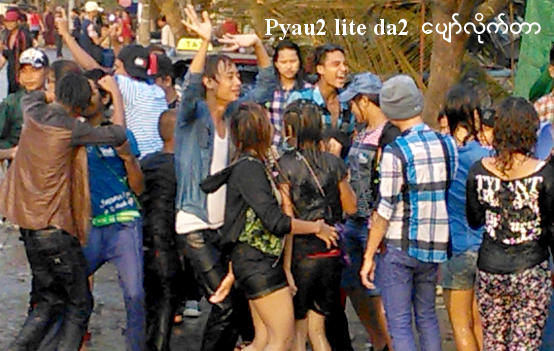Understand the Burmese Mind
Mind precedes all mental states.
Speak evil, and suffering is certain;
speak with a pure heart,
and happiness will follow
like a never departing shadow.
— Dhammapada —
In order to better understand the Burmese mind, I must include some aspects of boat-da1 ba2-dtha2
![]() (Buddhism), as approximately 85% of the population in this country are Buddhists, and Burmese culture is influenced by Buddhism.
(Buddhism), as approximately 85% of the population in this country are Buddhists, and Burmese culture is influenced by Buddhism.

Throughout our lives, we are swayed by the "Winds of the World" that shake our emotions like characters in the novels and block-buster movies. The term "Winds of the World" in Buddhism refers to the opposite pairs of "Eight Worldly Conditions":
Pleasure and Pain
Praise and Blame
Gain and Loss
Fame and Disgrace.
While most of us are naturally attracted to the positive extremes, we avoid the unpleasant situations at the polar opposite end. Unfortunately, those worldly conditions cannot be avoided in life all the time. In the process of seeking and avoiding those conditions, or when in contact with those conditions, we experience a colorful spectrum of emotions such as...
excitement
— sate-hloat-sha3 jin3
![]() (be excited [verb] + noun forming particle)
(be excited [verb] + noun forming particle)
anguish — way2-da1-na2
![]()
pride — ma2-na1
![]()
anger — dau3-dtha1
![]()
jealousy — ma1-na2-lo2 zate
![]() (feel jealous [verb] + mind [noun])
(feel jealous [verb] + mind [noun])
guilt — late-pya2 ma1-thun1 jin3
![]() (spirit + not + clean + noun forming particle)
(spirit + not + clean + noun forming particle)
happiness — pyau2-shwin2 jin3
![]() (be happy [verb] + noun forming particle)
(be happy [verb] + noun forming particle)
sorrow — wun3-neare3 jin3
![]() (feel sorry [verb] + noun forming particle)
(feel sorry [verb] + noun forming particle)
conceit — ba1-win2-myin1 jin3
![]() (be conceited [verb] + noun forming particle)
(be conceited [verb] + noun forming particle)
shame — a-shet kweare3 jin3
![]() (be put to shame [verb] + noun forming particle)
(be put to shame [verb] + noun forming particle)
worry — sate pu2 jin3 ![]() (be worried [verb] + noun forming particle)
(be worried [verb] + noun forming particle)
Myanmar Grammar Notes: The particle chin3 or hmu1 modifies verbs to nouns in several words. Such words are more often seen in literary form.
In spoken Burmese, the verb portion is usually used in combination with other words in phrases.
For example, sate pu2 jin3 is a worry (noun). The verb portion sate pu2 can be combined with the present participle forming particle nay2 and the ending affirmation word deare2 to form the phrase sate-pu2 nay2 deare2 meaning He/She is (or I am) worried.
If we don't constantly guard our minds, we are simply swept away by the flood of those emotions, which often result in negative cycle of effects and consequences. While we cannot avoid those worldly conditions, our conditioned responses and emotions are optional that are within our capability to control and "re-program" with practice.
For someone who is skilled in the art of Buddhist meditation as well as moral philosophy, he or she is indifferent to
those worldly conditions. What remains is the state of tranquility, where
calmness — ti2-nyain2 zate
![]() for oneself and
for oneself and
compassion — ga1-yu1-na2 zate
![]() or
or
empathy — mu1-de1-ta2
![]() for the others is felt in place of
for the others is felt in place of
jealousy — ma1-na2-lo2 zate
![]() and
and
sorrow — wun3-neare3 zate.
![]()
Simple emotional phrases
sate — mind
hloat-sha3 — move around
nay2 — present participle [..ing]
deare2 — affirmation.
sate hloat sha3 nay2 deare2 — (He is/ She is / I am) excited.
ma2-na1 — pride; ego; conceit
kji3 — big
deare2 — affirmation
ma2-na1 kji3 deare2 — He/she has a big ego.
de2 — this
lu2 — man
dau3-dtha1 — anger
kji3 — big
deare2 — affirmation.
de2 lu2 dau3-dtha1 kji3 deare2 — He is a wrathful person. He is someone who cannot control his anger.
ma1-na2-lo2 — be jealous (verb)
pfyit — become (verb)
nay2 — present participle [~ing] (particle)
deare2 — affirmation (postpositional marker)
ma1-na2-lo2 pfyit nay2 deare2 — He/she is jealous. (is displaying jealousy)
late-pya2 — spirit
ma1 — not
thun1 — clean
bu3 — negative ending
late-pya2 ma1-thun1 bu3 — I (or someone is) feeling guilty. My conscience is not clear.
wun3 neare3 — be sorry
ba2 deare2 — polite affirmation
wun3 neare3 ba2 deare2 — I'm sorry. (I feel sorry for you)
de2 — this
lu2 — man
ba1-win2 — perception of self
myin1 — tall
deare2 — affirmation.
de2 lu2 ba1-win2 myin1 deare2 — He is a haughty person.
shet — feel ashamed (verb)
sa1-ya2 — matter (this particle modifies the verb to noun)
ji3 — suffix parfticle to mean "big" and "considerable".
shet sa1-ya2 ji3 — It's so shameful; I am so ashamed. (Lit: it is something shameful.)
sate — mind
pu2 — hot
nay2 — present participle [~ing]
deare2 — affirmation.
sate pu2 nay2 deare2 — I am worried.
thu1 — him
a-twet — for
sate — mind
pu2 — hot
nay2 — present participle [~ing]
deare2 — affirmation.
thu1 a-twet sate pu2 nay2 deare2 — I feel worried about him/her.
sate — mind
ma1 — not
pu2 — be worried
ba2 — polite suggestion
neare1 — negative imperative.
sate ma1-pu2 ba2 neare1 — Don't worry!
More Burmese Phrases on the mental states
If there is just one word you that should remember from this page, it would be "sate".
sate — mind (noun)
mau3 — feel tired (verb)
deare2 — affirmation (postpositional marker)
sate mau3 deare2 — (I am) feeling anxious; having anxiety. (verb + postpositional marker)
sate — mind (noun)
na2 — to be painful (verb)
deare2 — affirmation (postpositional marker)
sate na2 deare2 — I feel hurt inside. (verb + postpositional marker)
sate — mind (noun)
kone2 — to have run out (verb)
deare2 — affirmation (postpositional marker)
sate kone2 deare2
— I am fed up. I have run out of patience.
(verb + postpositional marker)
sate — mind
ma1 — not
hso3 — bad
ba2 neare1 — please don't (polite suggestion + negative imperative ending)
sate ma1-hso3 ba2 neare1
— Please don't be angry with me.
sate — mind
ma1 — not
shi1 — have; to have
ba2 — polite
neare1 — negative imperative
sate ma1-shi1 ba2 neare1 — Please don't be angry.
In another words, it's like saying: Please don't have the mind with anger.
sate — mind
ma1 — not
chan3-dtha2 — be rich; be affluent
bu3 — negative ending.
sate ma1-chan3-dtha2 bu3 — I am unhappy.
When you say the opposite:
sate chan3-dtha2 deare2,
it means you are free from all the negative states of the mind such as worry, guilt, craving, rage, jealousy, and anxiety. In ancient Buddhist philosophy, freeing the mind from the shackles of those negative and unwholesome states is called the true happiness.

This is different from the modern Western idea of happiness as in
pyau2 lite da2
I am so happy! (happy + so much)
There is thrill and excitement in the later type of happiness. At the same time, such agitated state of the mind is fleeting and unstable because
of the impermanent nature of all existence, says the wise. Sooner or later, we will have to part with
conditions that make us
pyau2 lite da2,
and we are left with
toun1-ta1 sate - yearning
and struggle for the constant supply of the thrill. And, if we can't get it, we end up saying:
sate ma1-chan3-dtha2 bu3.
When someone tells you he or she is
sate ma1-chan3-dtha2 bu3,
you can say:
sate — mind
ma1 — not
koun3 — good
ba2 bu3 — polite negative ending word.
sate ma1-koun3 ba2 bu3
I'm sorry to hear that.
This is a useful phrase to sympathize with someone.
Do you find this sate-win2-za3 za1-ya2 ?
Do you find this lesson
sate-win2-za3 sa1-ya2 | interesting?
If you remember, back in lesson 20,
sa1-ya2 roughly means "matter".
sate-win2-za3 means "having interest". So,
sate-win2-za3 za1-ya2 (noun) is something interesting.
In deep analysis of the word
sate-win2-za3,
it could mean that whatever the state of the mind of the author is within you, and information or the knowledge has been transferred. In another words, my spirit comes alive as you read this sentence, no matter where or who you are, and no matter how far apart the time is when you observe this.
sate — mind
win2-za3 — be enticed
za1-ya2 — matter
beare3 — affirmation
sate win2-za3 za1-ya2 beare3 — That's interesting!
Bored and nyi3-ngway1
Perhaps, you find this mumbo jumbo extremely boring. "Feeling bored" in Burmese is
nyi3-ngway1.
You can say:
nyi3-ngway1 la2 byi2,
which means "I've started to get bored."
Another example:
mo3-ywa2 la2 byi2 — It starts raining.
In that case ....
Pure & Angelic late-pya2
I'd like to end this lesson with
late-pya2 thun1-dthun1,
meaning having a good heart, pure in spirit, and free from greed, hate and delusion as much as possible.
late-pya2 thun1 means having a clear conscience. May you all
sate — mind (noun)
hna1-lone3 — heart (noun)
shwin2-lun3 — feel fresh and energetic (verb)
chan3-myay1 — be serene, peaceful and tranquil (verb)
ja1 — plural word (particle)
ba2 zay2 — I wish ("may this happen" [postpositional marker])
sate hna1-lone3 shwin2-lun3 chan3-myay1 ja1 ba2 zay2
May all beings free from distress and find happiness!
